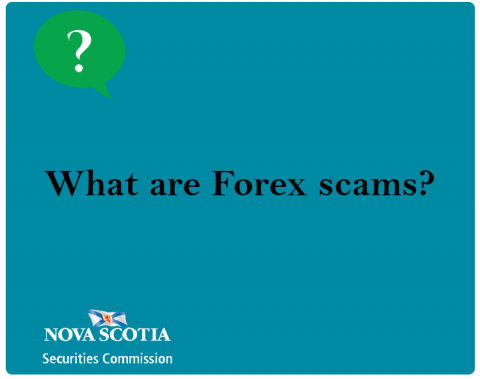Submitted by nsscadmin on

Today the Commission issued an investor alert warning Nova Scotian investors about an increase in Forex scams. The Commission has noticed an increase in Forex-related scams targeting Nova Scotians on social media, forums, online and print ads, and online sites like Kijiji.
Before we go into more detail on Forex scams, let’s briefly discuss Forex. We shared a blog post on Forex late last year which you can review for the full details on Forex. A quick recap on Forex:
- It is a global, decentralized over-the-counter market for the trading of currencies.
- It runs 24 hours a day from Monday to Friday and is one of the most actively traded markets in the world.
- Firms that offer Forex must be registered and they also must be members of IIROC, which oversees these firms.
- Trading Forex is speculative and extremely risky due to the extreme volatility of global currencies.
Trading Forex is legal but should be done with a registered firm. Forex is not widely known or understood by novice investors and this allows fraudsters and scam artists to use it to commit fraud and steal investors money.
Forex fraudsters typically find their victims by placing ads in newspapers, radio, on online forums, social media or websites like Reddit or Kijiji. The ads appear professional and legitimate and offer investors the opportunity to invest in Forex. The ads usually tout the company’s strong track record of profits and the promise of high returns for low risk. Buzz words and phrases like “guaranteed profit,” “ground-breaking algorithm,” “new trading scheme,” or “cracked the code on Forex” are often used to pique investors interest.
Almost all these ads are posted by scam artists that will not invest your money and will instead disappear with it never to be seen again. Even if they do invest your money, they likely will not fully disclose the high risk of Forex investing which could lead you to losing your entire investment.
Some of the warning signs that a Forex investing opportunity may be fraudulent include:
- a guarantee of little or no risk and high investment returns;
- dealers or brokers that are not registered with provincial or territorial securities commissions, and typically are based outside of Canada where it is difficult or impossible to protect or retrieve funds;
- an unwillingness to discuss the past performance or track record of the specialist traders who will purportedly handle your money;
- an unwillingness to identify specialist traders or traders located in offshore jurisdictions who will purportedly handle your money; and
- high-pressure sales techniques to buy a Forex investment, to purchase software or take courses related to Forex trading.
To determine if someone advertising Forex investing is legitimate always check their registration with securities regulators and with IIROC and do your research before handing over any money. If you are approached by someone offering Forex investing that you believe is fraudulent, report it to the Commission.
